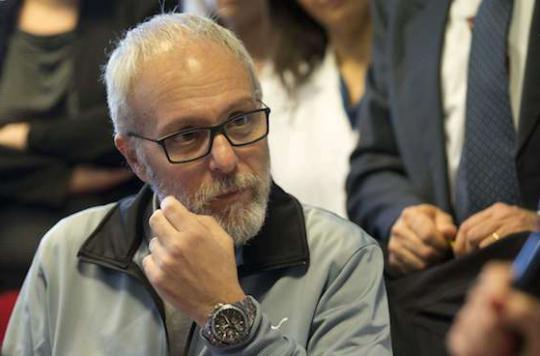PORTRAIT – His serene gaze says nothing about his experience. Fabrizio Pulvirenti has been close to death. Infected with Ebola in Sierra Leone, this doctor survived. Today, he campaigns for better training.

Of medium height, paunchy, hair and beard graying, this man does not correspond to the image that one can have of the humanitarian doctor. And yet Fabrizio Pulvirenti has treated Ebola patients in West Africa. “When I left for Sierra Leone, I was aware of the possibility of being contaminated by Ebola, he blurted out without hesitation. I didn’t expect to get sick, but I had factored in that risk when going. The Italian has been officially cured of Ebola since January 2, 2015. To date, the emergency physician is the only patient in the country infected in Sierra Leone. Since his return to Italy, he has campaigned for better training in the world. It is this workhorse that pushed him to participate in the development of the project. E-bola, a feature film lined with training tablets intended for doctors. Portrait of this man better known as “patient zero”.
A late retraining
Fabrizio Pulvirenti is a convert from humanitarian medicine. Retired from the medical service of the Italian Navy, he joined the NGO Emergency. His philosophy is simple: “I think there are a few differences that can be accommodated – salary, lifestyle, beliefs, domestic politics – and others that are unacceptable; the right to health care is one of them, ”he explains in December 2014 to Sicilia Journal.
The humanitarian mission in Lakka, Sierra Leone, is only the second of his second life. This will undoubtedly be the most striking. In November 2014, Dr Pulvirenti began to suffer from strange symptoms. “Almost immediately I had suspicions,” admits the 51-year-old. The symptoms that I had put the chip in the ear to me. I had the confirmation within 24 hours, thanks to a specific examination. The ax falls: it is the Ebola virus that infected this specialist in infectious diseases.
The Emergency team then offered to receive treatment in Italy, at the benchmark establishment: the Lazzaro Spallanzani Institute of Infectious Diseases. He accepts. “Not because I did not trust the doctors of Africa, he hastens to clarify, but because I thought about the difficulties that my family would encounter in repatriating my body if I died. “
” I slept a lot “
In the air-conditioned room of the Italian Ministry of Health, Fabrizio Pulvirenti calmly answers each question. Smiling and detached, he remembers with precision the sensations of this difficult journey. While still ill, he was transported to the airport in Freetown, the capital of Sierra Leone. Then begins a 6 hour flight that drops him off at the Pratica di Mare military airport in Rome. “I remained completely locked in a plastic container”, confides the doctor. Indeed, during all this time, the fifty-year-old is locked in a stretcher with a high level of containment (class 4 pathogen). Only two agents are on the P4 list: those causing haemorrhagic fevers (Ebola, Marburg, Lassa, etc.) or very contagious and fatal infectious diseases (smallpox, infections with Henipavirus…).
“The flight was done at night and I did not really realize the passing time, remembers Fabrizio Pulvirenti, concentrated. I was not in great shape because of the illness. I slept a lot, but a restless sleep. And then I went from a temperature of 30 ° C to the Italian winter, the thermal shock was violent. This father of two is then hospitalized at the Lazzaro Spallanzani Institute, in a negative pressure chamber, which filters the air while preventing pathogenic particles from escaping.
“Global health has failed”
On the treatment that saved his life, Fabrizio Pulvirenti prefers to remain silent. “I cannot divulge this detail,” he breathes, his face closed. He admits, more affable, to having given his blood. But he does not know what use will be made of it. “Now that I have developed antibodies, we can no longer use it as a treatment, but we can use it for research,” explains the man.
Since his recovery, Fabrizio Pulvirenti has remained very active. He wrote a short story, The mia battaglia contro Ebola (My battle against Ebola), in which he recounts his experience. He was able to “fill in the gaps” thanks to the memories of his fellow doctors and nurses in Sierra Leone and Italy. But above all, he found a new reason to fight: to ensure that caregivers are protected from this extremely contagious hemorrhagic fever. Because since the start of the epidemic, more than 800 caregivers have been infected. “If three years ago, there had been training in Africa, the first cases of Ebola would have been identified and there would not have been such an epidemic,” denounces Dr Pulvirenti. Global health failed with Ebola. “
.















